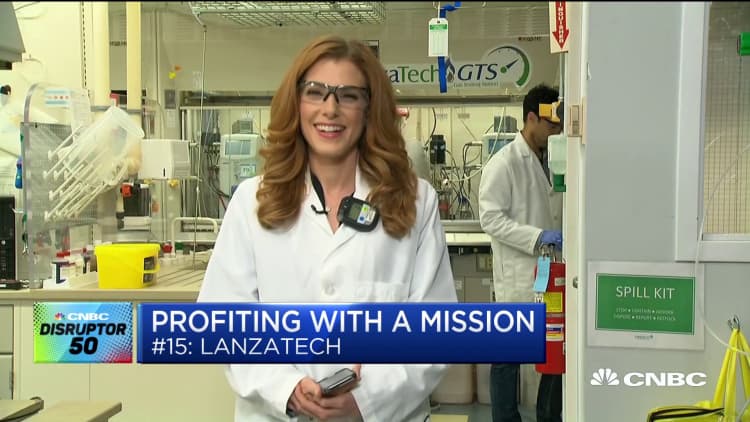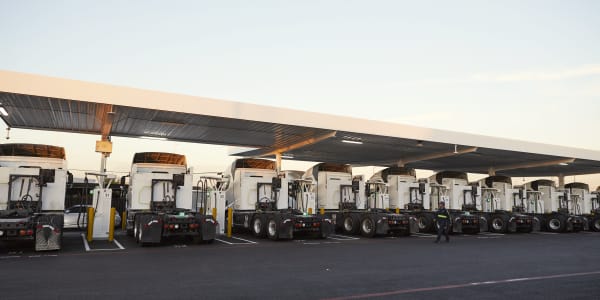
Chicago-area start-up LanzaTech has proved it can transform greenhouse gas emissions into fuels and chemicals. Now, the company is trying to bring its clean tech to the masses.
That means consumers could soon be taking flights powered by recycled carbon pollution and wearing sneakers synthesized from planet-warming waste gas.
Founded in New Zealand in 2005, LanzaTech sells technology that converts greenhouse gas emissions from steel mills and other industrial facilities into ethanol, a renewable fuel and chemical feedstock. The process allows LanzaTech's customers to turn their carbon pollution into products like jet fuel and the chemical building blocks for plastics.
The company's innovative technology and potential to shake up the biofuels space earned LanzaTech the No. 15 spot on CNBC's 2019 Disruptor list.
Green alternatives like the ones being pioneered by LanzaTech will be crucial in the coming years, as population growth and rising wealth create more demand for energy and consumer goods. Satisfying the world's growing appetite threatens to derail efforts to reduce greenhouse gas emissions and prevent the worst impacts of climate change.
LanzaTech addresses the planet's climate crisis on two fronts. By creating a use for the waste gas emitted from industrial facilities, it incentivizes companies to capture the emissions driving global warming. And since the waste yields fuel and chemicals, the process stands to reduce demand for oil.
The process pioneered by LanzaTech also presents an alternative to traditional biofuels, which are mostly made from corn and sugarcane. Today, creating ethanol means consuming land and water resources and harvesting the crops through carbon-intensive industrial farming.
Turning waste into biofuel
LanzaTech gets around that resource problem by partnering with industrial customers to capture carbon-rich emissions and pump them into a reactor filled with microbes first identified in rabbits. The microbes feed on the carbon and produce ethanol, the biofuel that is blended into most U.S. gasoline.
"The founding of company was really on the basis of this ideal feedstock philosophy, where we take existing high-volume, low-value waste streams from society, industry and agriculture to produce" fuel and chemicals, says Dr. Sean Simpson, co-founder and chief scientific officer at LanzaTech.
One of LanzaTech's biggest initiatives is producing jet fuel from its sustainable ethanol. The endeavor took a major step forward last fall when the company partnered with Virgin Atlantic and Boeing to complete the first commercial flight powered in part by LanzaTech jet fuel.
The fuel used in the flight was developed from a joint project between LanzaTech and the U.S. Department of Energy's Pacific Northwest National Laboratory. Now LanzaTech is working on funding a plant at its Freedom Pines facility in Georgia that can churn out 10 million gallons a year of jet fuel made from sustainable ethanol.
The United Kingdom also awarded LanzaTech a grant to study whether it's feasible to construct a British plant that would produce 30 million gallons per year of the jet fuel. The company wants to build another 30 million gallons per year facility elsewhere in the world.
LanzaTech is also looking beyond transport fuels to another booming sector: the petrochemicals industry, where fossil fuels are turned into plastics and other chemicals.
The technology already exists to convert ethanol into ethylene, one of the most common chemicals used to make plastics. But LanzaTech wants to go even further by introducing modified microbes into its reactors that yield a wide variety of chemicals. It has already been able to create acetone and isopropyl alcohol, two widely used chemicals.
"If we can produce, for example, a molecule used to produce a fiber or nylon or rubber, then we can take the carbon waste streams from society, industry and agriculture and fix them into everyday materials like tires and clothing and carpets," Simpson said.
LanzaTech believes that could lead to a new paradigm in manufacturing. In this new circular economy, carbon pollution would be turned into consumer products, and those products would then be broken down at the end of their useful life and recycled into entirely new products.
LanzaTech is in talks with goods makers to start rolling out products like clothing and consumer packaging that use this method, says Freya Burton, the company's chief sustainability and people officer.
Burton says these products made from the LanzaTech process could be marketed as "carbon smart." She sees consumers gravitating towards them the same way they buy organic and fair-trade goods.
The company will first have to scale up the number of facilities using its technology.
Today, the LanzaTech method is producing commercial quantities of ethanol from emissions captured at the Jingtang Steel Mill in northeastern China. Steel giant ArcelorMittal is also building a LanzaTech system at a steel mill in Ghent, Belgium.
There are also plans under way to produce ethanol from an oil refinery in India and the metals sector in South Africa. LanzaTech has also shown it can produce ethanol from municipal waste in Japan.






